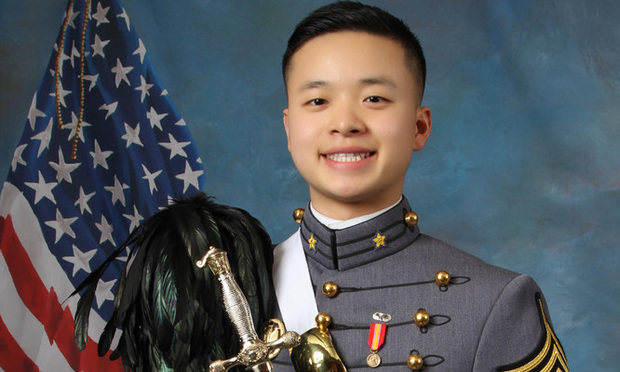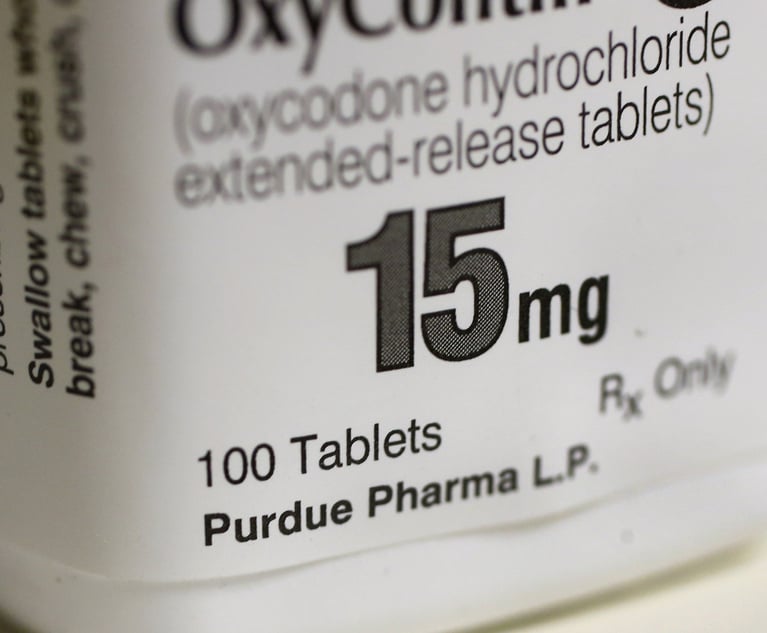Raising Bioethics Issue, Judge Rules Dead West Point Cadet's Parents Can Use His Sperm for Fertilization
In a ruling that is gaining national attention and causing concern among some bio- and medical ethics experts, a Westchester judge has ruled that the parents of deceased cadet Peter Zhu can use his harvested sperm how they like.
May 23, 2019 at 01:05 PM
8 minute read
 SMA cadet Peter L. Zhu. Photo: United States Military Academy via AP.
SMA cadet Peter L. Zhu. Photo: United States Military Academy via AP.
In the hours after West Point cadet Peter Zhu was declared brain dead from a February skiing accident, his devastated parents managed to take emergency legal action in an attempt to carry on his legacy.
“When Peter was alive, he often told us how he wanted children of his own one day, and that he wanted to give us grandchildren,” they wrote to a judge in Westchester County in a March 1 petition aimed at winning the right to have their dead son's sperm extracted and frozen for possible use with a surrogate mother.
“We are desperate to have a small piece of Peter that might live on and continue to spread the joy and happiness Peter brought to all of our lives,” the Zhus, who live in California, wrote. “It is also important to carry on Peter's legacy for deeply personal cultural reasons as well.”
On that day, Supreme Court Justice John Colangelo granted their wish of directing Westchester Medical Center to retrieve 21-year-old Peter's sperm from his body while it could still be done. However, the justice did not decide whether and how the sperm, which was to be sent to a bank for preservation, could be used.
Now, Colangelo—in a ruling that is gaining national attention and causing concern among some in the fields of bio- and medical ethics—has decided that the Zhus can use Peter's sperm however they like, including to create a new child.
In a carefully constructed 12-page opinion, Colangelo takes on the problem of Peter Zhu not having had a will or any “express direction with respect to the posthumous disposition or use of his genetic material.”
And in doing so, he tackles the analytical difficulty of not having direct precedent or much other guidance to help him reach a conclusion.
Ultimately, he decides that the evidence and few guideposts available “point to [Peter's] parents as the persons Peter would have intended to make decisions with respect to the preservation and disposition of the procreative fluids at issue.”
“The Court will place no restrictions on the use to which Peter's parents may ultimately put their son's sperm, including its potential use for procreative purposes,” Colangelo states. He also says that “as far as the Court can discern, no such restrictions are mandated by either New York or federal law.”
Still, Colangelo also issues a note of caution for Peter's parents, Monica and Yongmin Zhu.
“That is not to say, however, that Petitioners [the Zhu parents] may not need to surmount certain obstacles, or confront important residual issues should they chose to seek to use Peter's sperm for reproductive purposes,” he wrote.
“A specific use, once chosen, may run afoul, or at least merit consideration of, certain legal, practical, and ethical concerns, including the potential reluctance of medical professionals to assist in such a procedure,” he wrote.
“In addition,” he pointed out, citing Astrue v. Capato, 132 S, Ct. 2021 (2012), “the recognition of a posthumously conceived child as the son or daughter of the deceased may prove problematic; in some states, a child born after a certain period of time following the father's death may not be deemed such father's offspring for certain purposes.”
At the same time, Colangelo noted that the Zhus made it clear, during a March 21 telephone appearance before him, that “they are not now prepared to definitively state that they will use the sperm for third party reproductive purposes.”
Colangelo relies in his opinion on statements Peter made about his life plans and goals, and on related pieces of evidence such as a “baseball card” listing aspirations that Peter, like other West Point cadets, filled out during his senior year.
The judge doesn't stop there. He also describes two of the only instructive cases, both from California, that it appeared he could find. Then he cites two relevant articles, apparently written by ethicists and/or bioscientists, as well as a Case Western University Law Review article that discusses “unreported cases that permitted retrieval and potential procreative use of decedents's sperm on application of wife and parents.”
Moreover, he looks to relevant provisions of the state Public Health Law and the Estates, Powers and Trusts Law, which he says “serve as important additional, albeit imperfect guides as to a decedent's—here, Peter's—presumed intent.”
Addressing Peter's “past statements and actions,” Colangelo wrote that “in seeking to divine Peter's intent … there is a consistent thread running through his short life: the primacy of family and family relationships.”
For instance, he wrote, “Peter's parents testified to conversations they had over time with Peter, in which he related to them his dream of having several children, and the responsibility he felt to carry on his cultural and family legacy.”
And on his West Point “baseball card,” noted Colangelo, Peter—who had no known romantic partner when he died—wrote that he wanted to “[h]ave three kids, Get married before 30.”
Meanwhile, dovetailing with many of Colangelo's points was the parents' March 1 petition itself. In it, for instance, the mourning parents stated that “our family comes from China and an extremely important part of our Chinese culture is the tradition of [a son] carrying on out family lineage.”
Peter, they said, “took this role very seriously.”
Moreover, said the Zhus, he “told us that he wanted to have five children, and that his dream was to live on a ranch with his family and raise horses,” and, in turn, they said they would tease him about the expense of having so many children.
Colangelo, in another section of his opinion, addressed the sparse case law available, as well as the thoughts of ethicists on how a deceased person's genetic material should be handled. He wrote that “the talisman [for his decision] must be the decedent's intent” and “on this, the few courts that have addressed this issue and ethicists who have commented with respect to it tend to agree” that the deceased person's intent is paramount.
For example, he said, in Hecht v. Kane, 16 Cal. App. 4th 836 (Ct. of Appeal, 2d Dist. 1993), “the Court held that decedent's estate representative did not have the right to destroy decedent's frozen sperm in light of his expressed written intent that it be stored for possible future use by his longtime girlfriend.”
In examining certain New York laws, the judge noted as an example that “the Estates, Powers and Trusts Law sets forth the order in which those connected to the decedent take his or her property” and then Colangelo states where parents fit on that list.
The Zhu parents' lawyer, Joseph Williams, an associate at Copps DiPaola Silverman in Albany, said in an email sent to the Law Journal that he and the Zhus are “grateful that the court issued such a thoughtful and discerning decision, one which we believe to be the first reported decision in New York State on the issue of posthumous sperm retrieval and use.”
He added, “We are hopeful that this important precedent can be used to help other families like the Zhus going forward.”
“As you can imagine, this has been a very difficult and emotional process for [the Zhus], one which is far from over,” he also said, adding that “our clients continue to ask that their privacy be respected as they come to terms with their new reality—one which includes a life without their son, but also now includes the hope for future life.”
Monica Zhu has told The New York Post that the family wants privacy and won't comment on the case.
Despite Justice Colangelo's carefully weighed May 17 opinion, certain ethics professors are unconvinced that his decision was right.
Art Caplan, a New York University School of Medicine professor of bioethics and head of the division of medical ethics, for example, recently told The Washington Post that he disagreed with the ruling because parents shouldn't have control over offspring's reproduction.
“It doesn't exist in nature,” he said, reportedly.
One ethical consideration, he also told the Post, is what is in the best interest of the newly created child.
Caplan then raised questions, according to the Post, such as: Would the deceased person have wanted his or her child to be created using a surrogate? And, when and how would the dead parent have wanted the child to be told the truth about lineage?
This content has been archived. It is available through our partners, LexisNexis® and Bloomberg Law.
To view this content, please continue to their sites.
Not a Lexis Subscriber?
Subscribe Now
Not a Bloomberg Law Subscriber?
Subscribe Now
NOT FOR REPRINT
© 2025 ALM Global, LLC, All Rights Reserved. Request academic re-use from www.copyright.com. All other uses, submit a request to [email protected]. For more information visit Asset & Logo Licensing.
You Might Like
View All

NY Ready to Reopen Claim Against Purdue Pharma, If 60-Day Negotiating Window Closes Without Accord


Ready to Meet the Moment: Data Privacy and Cybersecurity Concerns Echo Throughout Biotech and Synthetic Biology
10 minute readTrending Stories
- 1Does the Treasury Hack Underscore a Big Problem for the Private Sector?
- 2Gen AI Legal Tech Startup Eve Raises $47 Million Series A Investment
- 3Hicks Johnson Promotes Lori Arakaki and Daniel Scime to Firm Partnership
- 4Buchalter Opens in Chicago With 25 Lawyers, Staff
- 5Assessing the Second Trump Presidency’s Impact on College Sports
Who Got The Work
J. Brugh Lower of Gibbons has entered an appearance for industrial equipment supplier Devco Corporation in a pending trademark infringement lawsuit. The suit, accusing the defendant of selling knock-off Graco products, was filed Dec. 18 in New Jersey District Court by Rivkin Radler on behalf of Graco Inc. and Graco Minnesota. The case, assigned to U.S. District Judge Zahid N. Quraishi, is 3:24-cv-11294, Graco Inc. et al v. Devco Corporation.
Who Got The Work
Rebecca Maller-Stein and Kent A. Yalowitz of Arnold & Porter Kaye Scholer have entered their appearances for Hanaco Venture Capital and its executives, Lior Prosor and David Frankel, in a pending securities lawsuit. The action, filed on Dec. 24 in New York Southern District Court by Zell, Aron & Co. on behalf of Goldeneye Advisors, accuses the defendants of negligently and fraudulently managing the plaintiff's $1 million investment. The case, assigned to U.S. District Judge Vernon S. Broderick, is 1:24-cv-09918, Goldeneye Advisors, LLC v. Hanaco Venture Capital, Ltd. et al.
Who Got The Work
Attorneys from A&O Shearman has stepped in as defense counsel for Toronto-Dominion Bank and other defendants in a pending securities class action. The suit, filed Dec. 11 in New York Southern District Court by Bleichmar Fonti & Auld, accuses the defendants of concealing the bank's 'pervasive' deficiencies in regards to its compliance with the Bank Secrecy Act and the quality of its anti-money laundering controls. The case, assigned to U.S. District Judge Arun Subramanian, is 1:24-cv-09445, Gonzalez v. The Toronto-Dominion Bank et al.
Who Got The Work
Crown Castle International, a Pennsylvania company providing shared communications infrastructure, has turned to Luke D. Wolf of Gordon Rees Scully Mansukhani to fend off a pending breach-of-contract lawsuit. The court action, filed Nov. 25 in Michigan Eastern District Court by Hooper Hathaway PC on behalf of The Town Residences LLC, accuses Crown Castle of failing to transfer approximately $30,000 in utility payments from T-Mobile in breach of a roof-top lease and assignment agreement. The case, assigned to U.S. District Judge Susan K. Declercq, is 2:24-cv-13131, The Town Residences LLC v. T-Mobile US, Inc. et al.
Who Got The Work
Wilfred P. Coronato and Daniel M. Schwartz of McCarter & English have stepped in as defense counsel to Electrolux Home Products Inc. in a pending product liability lawsuit. The court action, filed Nov. 26 in New York Eastern District Court by Poulos Lopiccolo PC and Nagel Rice LLP on behalf of David Stern, alleges that the defendant's refrigerators’ drawers and shelving repeatedly break and fall apart within months after purchase. The case, assigned to U.S. District Judge Joan M. Azrack, is 2:24-cv-08204, Stern v. Electrolux Home Products, Inc.
Featured Firms
Law Offices of Gary Martin Hays & Associates, P.C.
(470) 294-1674
Law Offices of Mark E. Salomone
(857) 444-6468
Smith & Hassler
(713) 739-1250






